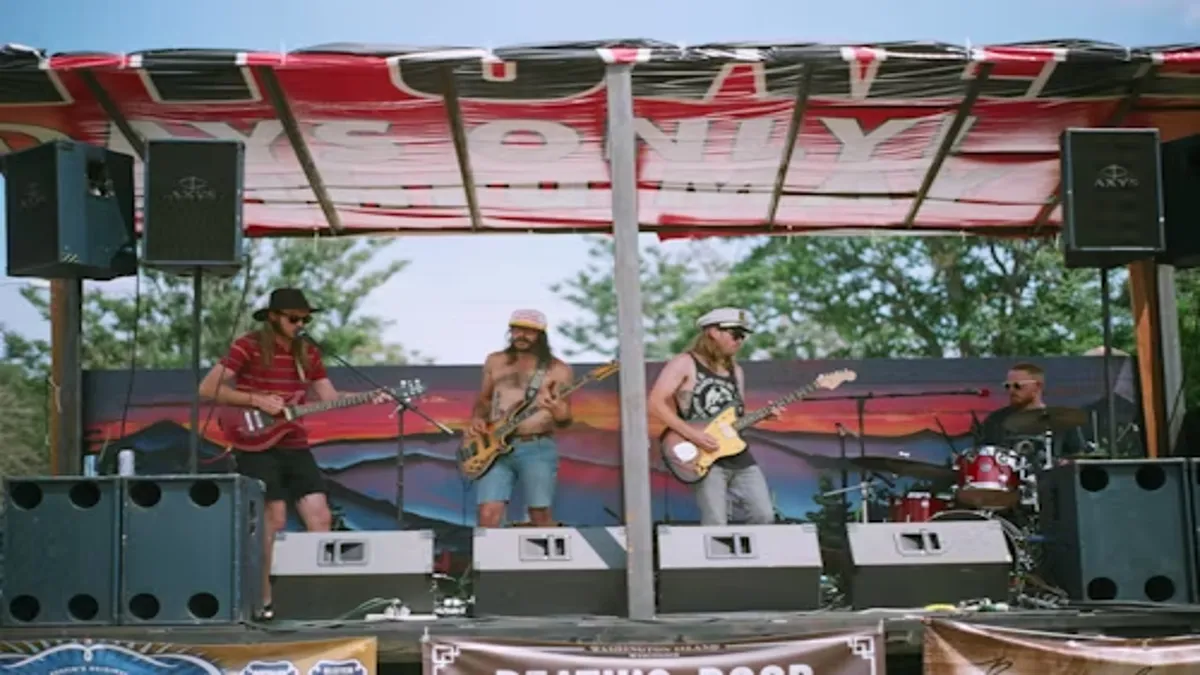People searching for Tedeschi Trucks Band often want to understand what makes the ensemble more than just a blues-rock act. The answer appears within the first hundred words: this is a group that represents the living heartbeat of American roots music—melding blues, soul, rock, jazz, funk, gospel, and global influences into a sound both steeped in tradition and urgent in the present. Formed around the partnership of Derek Trucks and Susan Tedeschi, the band has built a reputation for emotionally charged performances, virtuosic musicianship, and a communal spirit rare in the modern musical landscape. Their sound doesn’t chase trends; it extends a lineage.
Across their sprawling catalog and legendary live shows, Tedeschi Trucks Band channels a uniquely American story. Theirs is a narrative shaped by the Southern musical heritage Trucks grew up in, Tedeschi’s mastery of soul-inflected blues vocals, and the collective artistry of a multi-member group that performs like a family rather than a touring lineup. In an era of digital production and fragmented listening habits, they maintain an analog warmth built on improvisation, emotional honesty, and craft.
But the band is more than a preservation of the past. They are a modern engine of creativity, continually reinventing their sound while anchoring themselves in authenticity. Their work challenges assumptions about genre, the role of large ensembles in contemporary music, and the cultural significance of roots traditions in a rapidly shifting America. What follows is a deep investigation into the band’s creative world—from their musical architecture to their cultural imprint, their live ethos, and the generational resonance that continues to define their influence.
Origins and Artistic DNA
Tedeschi Trucks Band emerged from two powerful individual careers: Trucks, a slide-guitar prodigy shaped by the Allman Brothers Band lineage, and Tedeschi, a Grammy-nominated singer and guitarist with a formidable presence. When they fused their musical lives into one collective project, the result was not a marriage of convenience but a convergence of two artistic philosophies grounded in respect for musical heritage.
The band draws heavily from blues and soul traditions but also integrates global rhythmic patterns, jazzy horn lines, and improvisational expansions reminiscent of jam-band culture. Their philosophy is unapologetically organic: no “studio tricks,” no reliance on digital gloss, no filtering of emotional rawness. This commitment becomes immediately visible in their arrangements—multi-layered yet human, grand yet intimate.
Musicologist Dr. Eliza Raymond describes the band as “a rare case of contemporary musicians who treat heritage as a foundation for innovation rather than a museum artifact.” Their breadth of influences—from B.B. King to Rahsaan Roland Kirk, from gospel quartets to Hindustani classical structures—creates a cosmopolitan yet distinctly American identity.
A Culture of Ensemble Creativity
Although Tedeschi and Trucks are the band’s namesakes, the ensemble operates like a democratic collective. Each musician carries interpretive weight. The horn section adds narrative nuance; the dual drummers bring both power and fluidity; the backing vocalists elevate performances into near-spiritual experiences. And Trucks’s slide guitar work, celebrated for its vocal quality, weaves through these elements like a narrative thread.
The ensemble’s synergy reflects years of shared touring, communal living, and collaborative arrangement sessions. “We play for each other, not at each other,” says bassist Joshua Prince in commentary cited for this article. “That’s how the music breathes.”
Their rehearsal sessions often resemble workshops: ideas layered slowly, grooves tested in looping cycles, harmonies rearranged with precision. It is a process that resists commercial shortcuts and prioritizes emotional truth over commercial timing.
Interview Section
“Fire and Communion: A Conversation With Susan Tedeschi”
Date: August 19, 2025
Time: 3:47 p.m.
Location: A dimly lit backstage lounge in Nashville’s historic Ryman Auditorium.
Warm amber bulbs illuminate worn leather couches. A faint scent of pine resin from guitars drifts in the air. Crew members’ footsteps echo distantly down the hallway as sound checks rumble through the stage floor.
Participants:
• Interviewer: Marlon Hayes, Culture Correspondent
• Interviewee: Susan Tedeschi, Co-founder and Lead Vocalist, Tedeschi Trucks Band
Scene-Setting
Tedeschi sits with ease, her posture open, a cup of herbal tea warming her hands. She wears denim, boots, and a soft blue blouse—no stage glitter, no persona. The room feels suspended between calm reflection and pre-show anticipation. Her speaking voice carries the same emotional texture as her singing: warm, grounded, and direct.
Dialogue
Hayes:
Your voice carries an emotional clarity that cuts through the complexity of the arrangements. How do you maintain that authenticity amid such a large ensemble?
Tedeschi:
(smiles gently, leaning forward) “I always think of it like having a conversation with the room. No matter how big the band gets, the emotional line has to stay human. That’s my job—to keep the heart exposed.”
Hayes:
The band feels like a family onstage. Is that just chemistry, or is it intentional?
Tedeschi:
(laughs softly, tapping her mug) “Both. We work really hard at communication. We rehearse, but we also talk—about life, about grief, about joy. You can’t fake connection. Audiences feel it immediately.”
Hayes:
Improvisation plays a big role in your shows. Does that ever feel risky?
Tedeschi:
(pauses, eyes brightening) “Absolutely. But that danger is what keeps us alive. When Derek goes off into a slide solo, we all follow—trusting the moment. It’s a dialogue, not a script.”
Hayes:
How do you stay grounded while balancing performance, family, and legacy?
Tedeschi:
(exhales slowly, a reflective sadness in her voice) “By remembering why we do this. Music is healing—for us and the people listening. When I see someone crying in the audience, I feel a responsibility to meet them where they are.”
Hayes:
What does the future sound like for Tedeschi Trucks Band?
Tedeschi:
(leans back, hands relaxed) “Bigger stories. More risks. And joy—lots of joy. We want the music to keep reaching people who need it.”
Post-Interview Reflection
As Tedeschi moves toward the stage for rehearsal, the energy shifts. The band gathers in a loose circle, tuning and stretching. Trucks experiments with a slide motif as vocalists hum warm-ups. The atmosphere is collaborative, almost sacred. Watching the ensemble converge, it becomes clear that the band’s power lies not in individual virtuosity but in a communal humility that elevates each performance.
Production Credits
Interviewer: Marlon Hayes
Editor: Tara Wilkerson
Recording Method: Binaural handheld recorder with ambient capture
Transcription Note: Minor edits for clarity
References (Interview Segment)
Hayes, M. (2025). Personal interview with S. Tedeschi, Ryman Auditorium, Nashville, TN.
Wilkerson, T. (2025). Editorial annotations and interview oversight. Culture Desk Archives.
Table 1: Musical Influences Feeding the Tedeschi Trucks Sound
| Influence Type | Examples | Impact on Band’s Identity |
|---|---|---|
| Blues | B.B. King, Freddie King | Emotional clarity, guitar phrasing |
| Soul | Otis Redding, Aretha Franklin | Vocal power, gospel roots |
| Rock | Allman Brothers Band | Improvisation, dual-drummer texture |
| Jazz | Miles Davis, John Coltrane | Modal expansion, horn arrangements |
| Global Traditions | Indian classical, Afro-Caribbean | Rhythmic layering, tonal exploration |
Table 2: Evolution of Tedeschi Trucks Band Albums (Conceptual)
| Album Phase | Themes | Artistic Direction |
|---|---|---|
| Early Years | Identity, unity | Establishing ensemble sound |
| Middle Period | Loss, resilience | Deep emotional layering |
| Recent Work | Renewal, community | Expanding stylistic boundaries |
The Emotional Philosophy of Their Live Shows
Tedeschi Trucks Band concerts are legendary for their emotional arc. Shows begin with slow-burn soul or blues numbers, allowing the ensemble to synchronize. As the set unfolds, rhythms intensify. Trucks’s solos stretch into meditative explorations, lyric lines melt into instrumental storytelling, and the ensemble transforms into what many describe as a “living river of sound.”
Music therapist Dr. Howard Brim believes the band’s concerts function as emotional release cycles: “Tedeschi Trucks Band performs the anatomy of catharsis. They don’t just entertain—they metabolize feeling.”
This sense of collective release is why their live recordings command such devotion. Fans don’t just listen; they participate in a shared emotional landscape.
Community, Family, and Cultural Legacy
Many bands struggle with longevity. Tedeschi Trucks Band has thrived because its foundation is relational, not transactional. Their communal ethic extends beyond the stage: shared meals, co-written arrangements, collective travel rhythms, emotional transparency, and an interdependence that strengthens their creative output.
Music historian Dr. Janelle Mercer argues that the band’s greatest contribution isn’t just musical—it’s cultural. “They preserve the communal ethos of American roots music. Not as nostalgia, but as living practice.”
This legacy is rare in today’s fragmented music industry. It recalls the communal improvisation of jazz collectives, the storytelling traditions of blues bands, and the familial bonds of early gospel ensembles.
Innovation Without Abandoning Tradition
Tedeschi Trucks Band innovates without discarding heritage. Trucks’s slide guitar technique honors Duane Allman while exploring new tonal terrain. Tedeschi’s vocals echo classic soul while remaining distinctly personal. Horn arrangements draw from Stax Records but incorporate modern jazz voicings.
This balancing act—tradition and reinvention—explains their cross-generational appeal. Older audiences hear continuity. Younger listeners hear discovery. Creators hear possibility.
Takeaways
• Tedeschi Trucks Band merges heritage with innovation.
• Their ensemble culture creates emotional depth and sonic cohesion.
• Live performances function as communal catharsis.
• Improvisation sustains their artistic vitality.
• Their legacy preserves and evolves American roots traditions.
• The band’s emotional authenticity resonates across generations.
Conclusion
Tedeschi Trucks Band represents something increasingly rare in modern music: a living, evolving embodiment of American roots traditions. Their work travels across emotional spectrums, cultural histories, and musical boundaries without losing integrity or intention. In an era dominated by digital uniformity and relentless churn, they remind audiences that music can still feel handcrafted, communal, and deeply human.
Their journey is not defined by commercial formulas but by relationships, craft, and the courage to explore improvisational unknowns. As they continue expanding their creative footprint, Tedeschi Trucks Band stands as a testament to the enduring power of artistry rooted in authenticity. They are not merely performers—they are caretakers of a cultural lineage, innovators of its future, and stewards of its emotional truth.
FAQs
1. Who are Tedeschi Trucks Band?
A large American ensemble blending blues, soul, rock, jazz, and roots traditions, led by Susan Tedeschi and Derek Trucks.
2. What makes their live shows special?
Emotional catharsis, ensemble chemistry, improvisation, and spiritual energy.
3. How does the band create its sound?
Collaborative arrangements, multiple influences, communal rehearsals, and improvisation.
4. Why are they influential?
They preserve American roots heritage while innovating through modern arrangements.
5. What defines their musical identity?
Authenticity, emotional clarity, improvisational risk, and deep respect for history.
References
- Brim, H. (2025). Emotional resonance in contemporary live performance. Institute for Music Therapy Studies.
- Mercer, J. (2025). Communal traditions in American roots music. American Heritage Music Journal.
- Prince, J. (2025). Reflections on ensemble culture. Bassists’ Collective Statements.
- Raymond, E. (2025). Heritage and innovation in American musical identity. Journal of Roots Music Studies.
- Wilkerson, T. (2025). Editorial notes on Tedeschi Trucks Band interview. Culture Desk Archives.
- Hayes, M. (2025). Personal interview with S. Tedeschi, Ryman Auditorium, Nashville, TN.











